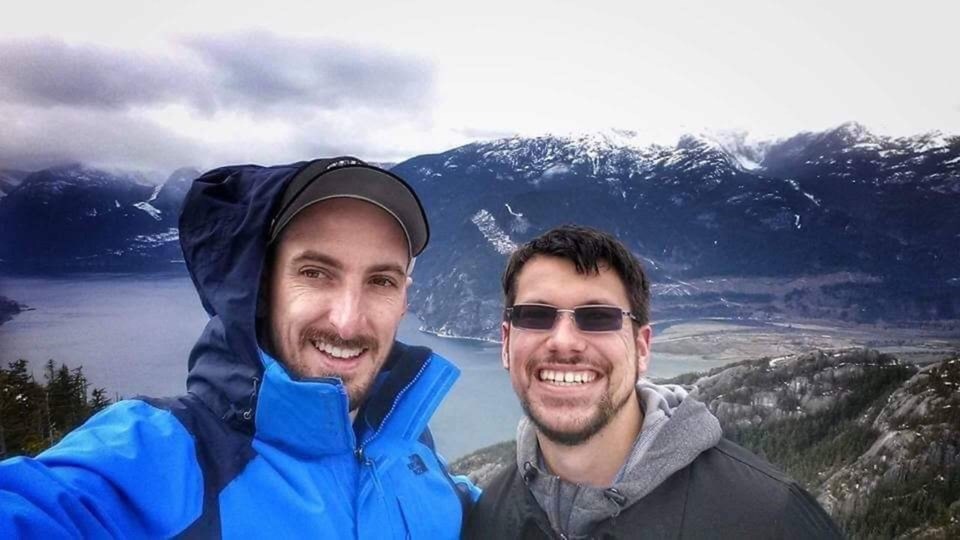When he was 11-years-old, Mark Selvidge was sitting in the back of the car his mother was driving on a stretch of highway in Alberta, when their vehicle crashed head-on into a flatbed truck that was parked partially in their lane.
His eight-year-old sister Nicole died in the crash and he was in a coma for three weeks before regaining consciousness.
That was 18 years ago.
"I had to relearn everything — like an infant," Selvidge recently recalled to The Chief. "The doctor said, 'He probably won't be able to walk or talk again,' — look at me now."
Selvidge, 29, remains partially paralyzed on his right side and has impaired vision.
He currently lives in Nova Scotia but visits Squamish regularly to see his cousin, Clancy Peterson, who is a local stunt performer, personal trainer, and custom bike builder.
Peterson, 34, is like a big brother more than a cousin, Selvidge said.
The pair is collaborating on a children's book to raise awareness about traumatic brain injury.
Selvidge wrote "My Jelly Brain," with his therapist, Betty-Ann Buott.
The book explains what it is like to have a brain injury and about the importance of protecting the head by wearing a helmet.
He is going to send it to elementary schools once it is done.
Selvidge has already toured schools in his community to talk about the issue.
"I did a melon drop experiment where I drop two melons — one with a helmet, one without," Selvidge recalled. "Then I cut each melon open and showed them."
He is motivated to better himself and educate others.
Approximately 1.5 million Canadians live with the effects of a brain injury and brain injury is a leading cause of death and disability for those under the age of 40, according to Brain Injury Canada.
Almost 25 per cent of people who survive catastrophic brain injuries will never leave their homes afterward, according to Brain Line, a brain injury awareness project.
"The biggest thing people don't understand... is that we have feelings too, and our feelings are the exact same as yours. We may not have the [same] outward appearance, but we still have the same freaking feelings," Selvidge said.
Squamish's Peterson, who is also a cartoonist, said he would finish illustrating the book in the next few months.
He recalled to The Chief how he and his family travelled from Australia, where he grew up, to Canada after Selvidge's accident.
"They really didn't think he was going to make it," Peterson said. "They had us go in and see him. They didn't necessarily say he wasn't going to make it, but they felt it necessary that everyone go in and see him."
The pair, though separated by distance, has remained close ever since, Peterson said, noting his cousin is "fiercely independent" despite his challenges.
"He's always looking to do something to help and anything I can do to help him on that path is going to be beneficial to the cause," Peterson said of illustrating the book.
Selvidge and Peterson also worked with stunt performer Kevin Fortin on an awareness video to tell Selvidge's story and raise awareness.
They hope to pitch the video as an educational piece for Brain Injury Canada.
Selvidge also has dreams of being on The Ellen Show or talking to Oprah about the cause.
"He's hugely ambitious," Peterson said.
Consequences of traumatic brain injury
*Long after the brain injury, the survivor may still feel mental and physical effects, or new symptoms may develop.
*Headaches are especially common after a brain injury, even months later. You may find that your headaches evolve into chronic pain, which can make even the lightest activities difficult.
*Brain injuries can affect how well you can concentrate.
*Injuries can also impact emotions, memory and sleep.
*Children with traumatic brain injuries may experience developmental problems.
If someone you know has a traumatic brain injury
*Help and support the survivor to have good health habits, such as being active, eating healthy foods, getting enough sleep, and limiting alcohol.
*Help the person take it one day at a time, setting small goals on the way to getting better.
~From www.healthlinkbc.ca
A video Selvidge made to gain the attention of Ellen DeGeneres.



